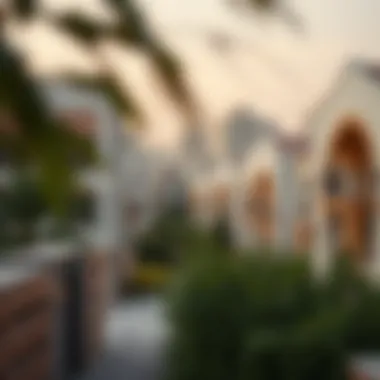In-Depth Look at the Dubai Real Estate Market Trends


Intro
The Dubai real estate market is a captivating blend of opportunities, challenges, and continual growth. With its ever-evolving landscape, this city has become a focal point for investors, expats, and realtors alike. Dubai's unique blend of luxury, innovation, and modern architecture attracts individuals from all corners of the globe, making it a prime destination for those looking to invest in property or find a home.
As the city continues to push boundaries, it's crucial for investors to grasp the current state and trends of the market. With demographic shifts, economic influences, and the overall global landscape, understanding Dubai’s real estate sector isn't just beneficial; it’s essential for making informed decisions.
By examining current trends, future predictions, and investment opportunities available within the city, this article acts as a guide. It details need-to-know aspects to help navigate this complex market, giving potential buyers, renters, and investors the insights they need to make educated choices. Let's dive into the heart of Dubai's real estate, exploring its dynamics and understanding how to capitalize on them effectively.
Market Insights
Current Trends in Dubai Real Estate
Dubai's real estate sector has seen a remarkable rebound following the uncertainty caused by global events. The market is currently characterized by a growing demand for both residential and commercial spaces. Recent studies show a significant uptick in property transactions, with developers responding to buyer preferences with innovative projects. For example, areas like Dubai Marina and Downtown Dubai have become hot spots for high-end luxury apartments while investment in the Jumeirah Village Circle (JVC) is rapidly increasing due to affordability.
Another trend catching attention is the shift towards mixed-use developments. These integrated communities combine residential living, retail spaces, and recreational areas, proving popular among millennial buyers looking for convenience and a sense of community.
Property technology (PropTech) is also revolutionizing the market. Tools utilizing virtual reality and artificial intelligence are now commonplace, allowing potential buyers to view properties remotely. This not only saves time but also broadens the reach for sellers, connecting them with international buyers seamlessly.
Future Predictions and Market Analysis
Looking ahead, experts anticipate continued growth in Dubai's real estate sector, attributed to several factors such as the Expo 2020 aftermath, which is expected to enhance tourism and boost economic momentum. There's strong speculation that by the year 2025, the demand for residential properties could see a surge of around 15%. This forecast is underpinned by the area’s strategic investments in infrastructure and amenities, signaling a stable environment for long-term stays and investments.
However, potential investors must keep their ear to the ground regarding market fluctuations. The recently introduced regulations surrounding property ownership and rental agreements indicate a clear need for adaptability and forward-thinking. Potential changes in legislation post-Expo might influence market dynamics, so staying informed will be critical.
Investment Opportunities
High-ROI Property Areas
Certain areas in Dubai are proving lucrative for investors seeking high returns. Notably, districts such as Dubai South and Al Furjan are increasingly recognized for their growth potential. Al Furjan, with its comprehensive master plan and developing urban infrastructure, is attracting families looking for affordable prices and community-centric living.
On the other hand, the Dubai Creek Harbour project is another investment gem. It's envisioned as a new downtown with a strong focus on sustainable living and community development, establishing itself as a promising high-ROI area.
Tips for First-Time Investors
For those stepping into the Dubai real estate market for the first time, keeping a few pointers in mind can set the stage for success:
- Understand the Market: Spend time researching neighborhoods, upcoming projects, and market trends.
- Start Small: Consider investing in smaller properties or off-plan developments with lower entry costs.
- Leverage Local Expertise: Enlist the help of local realtors to navigate legalities and find the best deals.
- Be Wary of Fluctuations: Markets can change rapidly; keep an eye on economic indicators.
- Think Long-Term: Aim for properties that promise sustained appeal for years ahead.
Overview of the Dubai Real Estate Market
The Dubai real estate market stands as a fascinating tapestry interwoven with the threads of luxury, innovation, and shifting socioeconomic dynamics. Understanding this market is crucial not just for investors but for anyone with a stake in the property realm, including expats, developers, and even property managers. The sheer vibrancy of Dubai, marked by its iconic skyline and sprawling developments, means that property transactions are not merely financial exchanges; they are also reflections of lifestyle aspirations, strategic investments, and cultural shifts.
Historical Context
Dubai's journey in real estate has not always been a smooth ride. Historically, the emirate evolved from a small fishing village into a global hub, driven in no small part by its strategic geographic location and buoyant oil revenues. In the late 20th century, economic diversification efforts led to burgeoning real estate development initiatives. Landmark projects, like the Burj Al Arab and Palm Jumeirah, transformed Dubai's skyline and set a precedent for luxury living and tourism. However, markets are also prone to cycles. 2008's global financial crisis hit Dubai hard, leading to a plummet in property values. Nonetheless, recovery came, driven by government regulations that encouraged foreign investment and initiatives like the Dubai Expo 2020, which brought renewed interest in both commercial and residential real estate.
Current Landscape
Today, the Dubai real estate market is characterized by an intriguing mix of opportunity and challenges. Properties in Dubai are not just about ownership; they represent a lifestyle. The laws governing foreign ownership, allowing non-UAE nationals to invest in designated areas, have led to a surge in interest from expatriates and foreign nationals. This influx has driven prices up in certain hotspot areas while other regions still deal with oversupply. As for current trends, the demand for luxury properties is sharp as high-net-worth individuals flock to Dubai, attracted by tax incentives and lifestyle offerings. Moreover, sustainability has started to take precedence, with developers inclined towards eco-friendly designs and smart technologies, responding to a more conscious global market.
"Dubai's real estate is a canvas, painted with the ambitions of its people and the dreams of investors."
Key Market Drivers
Understanding the key market drivers of the Dubai real estate landscape is crucial for potential investors, expatriates, and property managers. These drivers shape the market conditions and largely influence property values, thus guiding investment decisions. When one examines the vibrancy and growth of real estate in this city, one comes to appreciate that it’s not just about property but rather the interplay of various dynamic factors that fuel this progression.
Economic Factors
The economic drivers of the Dubai real estate market are myriad, connecting deeply with the global economy. With a diversified economy, Dubai's reliance on oil has reduced, thanks in part to sectors like tourism, aviation, and fintech gaining traction. This prosperity has led to higher disposable incomes and an increase in demand for both residential and commercial properties. The UAE’s GDP growth positively impacts investor confidence and incentives and, thus, inherently nourishes the property market.
Moreover, specific incentives, such as tax-free living and low-interest rates, play pivotal roles. Investors are continually drawn to Dubai because of this financial leniency. Properties in areas like Downtown Dubai or Dubai Marina have become coveted jewels, setting benchmarks for luxury living.
Regulatory Framework
A robust regulatory framework underlines the stability and appeal of Dubai’s real estate market. The government has introduced a variety of measures to safeguard investments, making it easier for foreign investors to buy and sell properties. For instance, the Dubai Land Department and the Real Estate Regulatory Agency (RERA) are committed to ensuring transparency, which ultimately fosters trust among stakeholders.
Understanding ownership laws is reckoned as vital for making informed decisions. The Freehold Areas allow non-UAE nationals to own property, effectively significantly boosting foreign investment. Regulations governing property rentals have also made it more straightforward for landlords and tenants by establishing clear guidelines regarding tenant rights and responsibilities. Knowing these regulations is like having a map before embarking on a journey in a foreign land.
Demographic Changes


Demographic trends strongly influence real estate demands in Dubai. The city has become a cultural melting pot attracting expatriates from across the globe. With a growing population exceeding three million, demand for housing has never waned. The inflow of professionals searching for better career opportunities nudges the residential market upward while bolstering rental demand as new residents seek places to live.
Additionally, younger generations are driving a shift in preferences towards more affordable, community-centric living, making it essential for developers to respond accordingly. As more millennials opt for rental properties in vibrant districts, traditional homeownership is gradually seen as less appealing.
"Dubai's demographic shifts are not merely numbers; they signify a vibrant tapestry of cultures and lifestyles influencing each property decision."
Recognizing these trends is vital for anyone keen on investing or operating within this dynamic environment. Overall, economic factors, regulatory frameworks, and changing demographics create a multi-faceted landscape that investors must navigate with astuteness.
Property Types and Their Performance
Understanding the diverse landscape of property types in Dubai is crucial for investors, realtors, expats, developers, and property managers. Each category—residential, commercial, and vacant land—offers unique benefits and considerations, influencing investment strategies and market movements. When assessing the performance of these properties, one must look at prevailing market trends, buyer preferences, and how external factors such as regulations and economic conditions impact these segments. This analysis sheds light on the vital role these property types play in shaping the Dubai real estate environment.
Residential Properties
Residential properties in Dubai encompass a range of options from lavish villas in Palm Jumeirah to chic apartments in Downtown Dubai. These properties remain the backbone of the real estate sector, providing housing for a burgeoning expatriate community and local citizens alike.
Investors are particularly drawn to high-demand areas due to their potential for capital appreciation. Popular districts like Dubai Marina and Jumeirah Beach Residence not only offer beautiful views but also attract renters willing to pay a premium for modern amenities and convenience.
Some key factors influencing residential property performance include:
- Location: Proximity to schools, hospitals, and shopping centers can dramatically swell demand.
- Amenities: Properties equipped with features such as swimming pools, gyms, and play areas tend to attract a wider demographic.
- Regulatory Environment: Changes in ownership laws or rental regulations can impact the attractiveness of these investments.
As a result, understanding the evolving preferences of potential buyers and renters is essential for maximizing returns in this segment.
Commercial Properties
The commercial property market is vigorous in Dubai, driven by a mix of local entrepreneurship and international business interests. From sleek office towers in Business Bay to vibrant retail spaces in summer malls, this sector showcases a dynamic landscape.
Investing in commercial properties often yields high returns, but it comes with its share of risks. Factors such as economic conditions, the business climate, and the stability of tenant covenants can sway investment outcomes.
Consider these essential points when evaluating commercial properties:
- Market Conditions: A thriving economy tends to increase the demand for office spaces and retail outlets.
- Lease Structures: Long-term leases provide stability, while short-term agreements may offer flexibility.
- Location and Foot Traffic: The success of retail properties, in particular, relies heavily on visibility and accessibility.
Commercial real estate in Dubai is a multifaceted area ripe for exploration, particularly as new infrastructure projects emerge.
Vacant Land and Development Projects
Investing in vacant land and development projects is another facet of the Dubai real estate market that shouldn’t be overlooked. With the constant push for urban development, purchasing land offers potential for significantly increased value over time.
Here are some considerations for investors interested in this segment:
- Zoning Regulations: Understanding what is permissible on purchased land can guide development opportunities.
- Market Demand: Researching areas earmarked for future growth can provide insights into likely hotspots in the years to come.
- Infrastructure Improvements: Proximity to upcoming metro stations or highways can make vacant land much more appealing.
Many developers thrive on identifying parcels of land for mixed-use developments, which can respond well to market demands while also promising long-term returns.
In summary, the performance of property types in Dubai hinges on thorough market analysis and understanding the nuances of each segment. This awareness empowers informed decision-making, which is essential for successful investment in this vibrant market.
Investment Opportunities in Dubai
Investment opportunities in Dubai are abundant and diverse, making it a prime location for both local and international investors. The combination of steady economic growth, a favorable tax environment, and a robust infrastructure appeals to those looking to capitalize on this vibrant market. With rapid urbanization and a visionary approach to development, the emirate has positioned itself as a global hub for business and tourism, naturally boosting the real estate sector.
An investor's decision hinges on several factors, which include understanding the market dynamics, recognizing potential growth areas, and evaluating luxury market trends. Investors must navigate these elements carefully to exploit the full potential of their investments in Dubai’s real estate market.
High-Growth Areas
When discussing high-growth areas in Dubai, one cannot overlook neighborhoods that are experiencing a surge in development and interest. Areas like Dubai Marina, Downtown Dubai, and Jumeirah Lake Towers have seen substantial increases in property values over the years. However, newcomers like Dubai South and Mohammed bin Rashid City are emerging as promising markets.
- Dubai South: This area, which includes the Al Maktoum International Airport, is positioned for massive growth due to its planned developments, such as Expo 2020-themed residential projects.
- Mohammed bin Rashid City: This district, meant to redefine luxury living, consists of residential, commercial, and retail spaces, catering to a myriad of lifestyles.
- Nad Al Sheba: Renowned for its more affordable housing options, this locality has become increasingly attractive to young professionals and families alike, thereby driving demand.
Understanding these growth areas involves recognizing not only their current demand but also the planned future investments that promise to enhance their appeal. It’s evident that buyers and investors should keep a keen eye on these neighborhoods as they may represent rewarding opportunities down the line.
Luxury Market Trends
The luxury property market in Dubai is unique; it continues to attract affluent buyers seeking opulence paired with innovative design. Several trends illustrate the evolving nature of the luxury segment.
- Urban Luxury Living: There’s a marked shift towards high-rise apartments offering breathtaking views and all-encompassing amenities. This trend is particularly strong in areas like Palm Jumeirah and the Burj Khalifa vicinity.
- Sustainable Luxury: Investors are increasingly drawn to developments that prioritize sustainability and smart technology. Projects that embrace eco-friendly practices are not just more marketable but align with the values of a new generation of wealthy buyers.
- Cultural Appeal: Incorporating local culture into luxury developments is becoming a selling point. The market has seen the rise of unique architectural styles that reflect Emirati heritage, thus enriching the living experience.
In summary, the luxury market in Dubai is thriving with a focus on innovation and lifestyle, essential for investors to consider as they formulate their strategies. The market is dynamic, and staying informed about these luxury trends can offer investors an edge in making savvy purchases.


"Dubai’s real estate landscape is evolving, presenting unique and compelling investment opportunities amid ongoing changes in buyer preferences and neighborhood developments."
For further insights, you may explore resources like Dubai Land Department for up-to-date market statistics and detailed regulations.
Challenges Facing the Market
Understanding the challenges faced by the Dubai real estate market is crucial for any investor or stakeholder. The landscape is not just about opportunities; it comes with its share of hurdles that can impact investment decisions and market growth. Acknowledging these challenges allows investors to strategize effectively, adjust their expectations, and adapt to the dynamic nature of the market.
Market Oversupply
Dubai's real estate market has been grappling with a significant oversupply of properties in recent years. As developers rushed to capitalize on the booming demand, an influx of new projects flooded the market. This has resulted in a surplus of available units, leading to increased competition among sellers and landlords.
This oversaturation can create downward pressure on property prices and rental rates, potentially diminishing the returns on investment. Investors may find themselves in a tricky spot when trying to sell or lease properties in a crowded marketplace. Consequently, understanding the current supply levels is vital for making informed investing decisions.
Investors should keep an eye on the following key aspects to navigate through this challenge:
- Market research: Stay updated with data regarding property types and neighborhood performance.
- Timing: Consider waiting for a market correction before making large purchases.
- Diversification: Explore investments in various districts that show potential for future price stability.
By being aware of these dynamics, potential buyers can better position themselves to take advantage of opportunities when they arise.
In real estate, location matters, but so does timing. The best opportunities often arise during periods of market adjustment.
Fluctuating Demand
Fluctuating demand is another challenge that has added complexity to the Dubai real estate landscape. Demand can swing wildly due to various factors, including changes in global economic conditions, geopolitical issues, and local regulations. For instance, periods of economic uncertainty often lead potential buyers to hold off on property purchases, creating an environment of hesitation.
Buyers today are also more discerning, with many preferring properties that offer value beyond mere square footage. Features such as sustainability, community amenities, and proximity to transport links have become essential and can influence purchase decisions significantly.
Investors should be mindful of understanding the underlying factors that could influence demand, such as:
- Economic indicators: Monitor GDP growth, employment rates, and tourism numbers.
- Regulatory shifts: Stay alert to any changes in laws governing ownership and investments.
- Demographics: Keep an eye on trends related to expatriate populations and local preferences.
Adapting to demand fluctuations involves staying agile and being prepared to pivot strategy as the market shifts. This adaptability can often make the difference between a successful investment and a missed opportunity.
Impact of COVID-19
The COVID-19 pandemic significantly reshaped the Dubai real estate market, creating a ripple effect that is felt across various sectors. Understanding the implications of the pandemic is crucial for investors, realtors, and property managers, as it highlights the vulnerabilities and resilient aspects of this dynamic market. The economic fallout, including disruptions in travel and a shift in consumer behavior, had a profound impact on property values, demand, and the overall investment landscape.
Market Resilience
Dubai’s property market showcased an impressive degree of resilience in the midst of turmoil. Initially, there was a sharp decline in transactions as lockdowns were imposed and uncertainty gripped the globe. However, by the latter half of 2020, recovery signs began to emerge. This resurgence was driven by a combination of factors:
- Government Initiatives: Efforts such as visa reforms, stimulus packages, and reduced fees helped stimulate the market.
- Interest Rates: The Central Bank’s decision to lower interest rates made borrowing more attractive, encouraging buyers to invest despite the uncertainties.
- Sector Flexibility: Developers quickly adapted, prioritizing spaces conducive to remote work, such as home offices or larger living areas, addressing the newfound needs of residents.
Such adaptations have not gone unnoticed; buyers are now more inclined to consider properties that enhance their quality of life, indicating a permanent shift in buyer expectations.
"While the pandemic presented challenges, it also acted as a catalyst for transformation within the market, showcasing Dubai's ability to absorb shocks and pivot as necessary."
Shifts in Buyer Preferences
The pandemic has undeniably influenced buyer preferences, leading to notable trends in what potential homeowners and investors are seeking.
- Increased Demand for Larger Spaces: With the rise of remote work, many are opting for larger properties that allow for home offices and more living space. The preference has shifted from smaller, high-density apartments to family homes or villas.
- Focus on Community Amenities: Buyers are now factoring in amenities like parks, gyms, and leisure facilities within their residential communities, opting for neighborhoods that foster a sense of community and well-being.
- Suburban Appeal: Areas that were once considered outliers are now receiving increased interest. Suburban locales with better access to green spaces, less congestion, and lower costs are proving attractive as people prioritize health and comfort.
- Sustainability Considerations: Post-pandemic, there's a heightened sensitivity towards environmentally friendly living. Properties boasting sustainable practices and energy-efficient designs are gaining favor among conscientious buyers.
Ultimately, these shifts underscore how the pandemic has forged a new pathway for real estate in Dubai, prompting both investors and developers to recalibrate their approaches for the foreseeable future.
Neighborhood Insights
Understanding the neighborhoods within Dubai's real estate market is crucial for any investor, buyer, or renter. Each area possesses its unique charm and characteristics, influencing property values and the lifestyle of its residents. This section sheds light on why neighborhood insights are important and how they can impact decision-making.
Reasons Why Neighborhood Insights Matter
- Property Value Fluctuations: Neighborhoods can greatly affect property values. Properties in more desirable locations, often with better amenities and transport links, typically appreciate more over time. Analyzing locations allows investors to predict future value changes.
- Target Audience: Identifying the right neighborhood helps in understanding the target demographic. For example, areas like Dubai Marina attract expats and young professionals due to vibrant nightlife and amenities, creating continuous demand. A savvy investor would consider the target audience when seeking investment opportunities.
- Community Lifestyle: Each district has its personality; some are family-oriented while others cater to singles or retirees. Understanding these nuances assists buyers in aligning their purchases with their lifestyle needs. Knowing what each area offers in terms of schools, parks, and shops can shape buyers' choices significantly.
- Long-Term Investments: Investors looking for long-term returns must consider the stability of the neighborhood. This includes crime rates, future development plans, and infrastructure projects. Areas earmarked for revitalization can present golden opportunities for those willing to invest early.
"Location, location, location! This saying rings true in real estate, particularly in a diverse market like Dubai. Knowing the neighborhoods can make or break an investment."
District Profiles
When diving into the different districts of Dubai, each presents distinct attributes that cater to diverse preferences and investment strategies.


- Downtown Dubai: Home to iconic landmarks like the Burj Khalifa and Dubai Mall, this area commands high property values. The mix of luxury apartments and businesses make it a sought-after locale for affluent buyers.
- Dubai Marina: This waterfront district is buzzing with life, attracting younger populations and expats. Residential choices range from mid-tier apartments to luxurious penthouses, ensuring something for everyone.
- Arabian Ranches: Perfect for families, this community is renowned for spacious villas and a family-friendly environment, complete with schools and parks within reach.
- Jumeirah: Known for its beaches and upscale living, Jumeirah is where luxury meets tradition. High-end villas alongside beachfront properties make it desirable for wealthy buyers.
Emerging Hotspots
As Dubai evolves, so does its real estate landscape. Emerging neighborhoods present untapped potential and opportunities.
- Dubai South: A government-led initiative, it's positioned to become a significant residential and business area thanks to its proximity to the Expo 2020 site.
- Al Furjan: With ongoing developments and accessible transportation, Al Furjan has swiftly garnered attention from both investors and homeowners alike for its value for money.
- Mohammed Bin Rashid City: This ambitious project aims to add luxury and leisure options, enhancing the overall appeal of the area. The canal system proposed will create a picturesque waterfront, attracting lifestyle investors.
Exploring these burgeoning neighborhoods can uncover favorable investment opportunities as buyers and renters seek affordability paired with livability.
By keeping a finger on the pulse of neighborhood dynamics, investors can navigate the Dubai real estate market more effectively and make informed decisions.
Regulatory Considerations for Investors
When stepping into the labyrinth of the Dubai real estate market, understanding the regulatory framework is akin to having a reliable compass in a foreign land. It shapes every move investors make, guiding them through opportunities and potential pitfalls. This section delves into key regulations that influence property dealings in Dubai, emphasizing ownership laws and rental regulations as essential pillars for any investor's strategy.
Ownership Laws
Understanding ownership laws in Dubai is fundamental for anyone looking to invest in property. The United Arab Emirates has quite a unique stance on real estate ownership, which varies significantly from many other markets. Here, foreign ownership is indeed allowed, but under specific conditions.
- Freehold Areas: Many expats and foreign investors can buy properties outright in designated freehold areas. These zones include renowned districts like Dubai Marina or Downtown Dubai, where ownership comes with the full rights typically associated with property ownership. This means you can indeed acquire land, build, and sell without hurdles, assuming you follow the set processes.
- Leasehold Areas: Conversely, in leasehold areas, foreign buyers may only lease a property for a limited time, generally up to 99 years. This could work well as a temporary solution but has longer-term implications on value and investment returns.
Investors ought to be aware that laws can shift, reflecting the needs of the market and broader economic factors. Keeping an eye on regulatory updates through local government resources, such as the Dubai Land Department, helps investors stay informed.
Rental Regulations
The rental landscape in Dubai is not just about acquiring tenants; it's about understanding the rules that govern rental agreements. These regulations aim to protect landlords and tenants alike, achieving a balance that is essential for market stability.
- Rental Cap: One critical regulation is the rental increase guideline. Dubai imposes limitations on how much a landlord can increase the rent annually—typically, it's tied to the consumer price index. Investors should familiarize themselves with these ceilings to strategize effectively, especially if they wish to maximize returns without alienating renters.
- Eviction Procedures: Equally important are the rules surrounding tenant eviction. In Dubai, landlords must adhere to stringent protocols when seeking to evict a tenant for defaulting on rent. This process must align with local laws, necessitating proper legal documentation to prevent disputes. With the fluctuating nature of tenant behavior and economic conditions, it’s critical to gauge the rental market and adapt accordingly.
"Navigating the nuances of rental regulation can mean the difference between profit and loss."
Investors looking to thrive in Dubai need to approach rental strategies with a finger on the pulse of both tenant rights and landlord obligations. Developing a well-rounded understanding of these laws not only fosters trust but can lead to long-term, fruitful investment scenarios.
Future Projections
Understanding the trajectory of the Dubai real estate market is crucial for stakeholders, whether they are investors, developers, or renters. Future projections encompass anticipated trends and challenges that can significantly affect decision-making processes in this vibrant market. This section highlights vital aspects such as market dynamics, technological influences, and legacy patterns that shape the Dubai landscape.
Market Trends to Monitor
When assessing the future prospects of Dubai's real estate market, several key trends stand out:
- Sustainability Initiatives: The emphasis on eco-friendly buildings is not just a trend but a necessity. Developers are increasingly integrating sustainability into their projects. This includes energy-efficient technologies that could lead to significant operational cost savings.
- Virtual Real Estate Solutions: With the rise of digital platforms, real estate transactions are becoming more streamlined. Innovations like virtual reality property tours allow potential buyers and renters to experience properties from their homes, thus widening the market reach.
- Luxury Market Resilience: The luxury segment remains robust despite economic fluctuations. High-net-worth individuals view Dubai as a safe haven for investment, thus sustaining demand for high-end properties.
- Regulatory Changes: Anticipated governmental reforms can enhance foreign investment. Changes in ownership laws and visa regulations can attract more expatriates and investors, impacting property demand positively.
Staying abreast of these trends enables stakeholders to make informed decisions, maximizing potential returns on investment.
Potential Challenges Ahead
While there are many optimistic trends on the horizon, challenges also lurk:
- Market Saturation: An oversupply of properties has become a pressing issue. Various developments completed over recent months may outpace demand, putting pressure on property values and rental rates.
- Economic Influence: Global economic conditions, such as fluctuations in oil prices or geopolitical tensions in the region, can have a ripple effect on Dubai’s real estate stability.
- Shifting Buyer Preferences: As priorities change, especially in a post-pandemic world, buyers may lean more toward affordable housing options or properties with greater amenities. This shift could reshape demand, leaving luxury residential areas vulnerable.
- Technological Adaptation: As the market moves towards digitalization, those unable or unwilling to adapt to new technologies may fall behind. Agents and property managers must stay current to maintain competitiveness in this evolving landscape.
In a nutshell, stakeholders in the Dubai real estate market must navigate both opportunities and hurdles. By keeping a vigilant eye on both trends and potential roadblocks, investors and developers can make strategic decisions that align with future market dynamics.
The End
In wrapping up this in-depth examination of Dubai's real estate market, understanding the intricate interplay of various factors is crucial for investors and buyers looking to navigate this vibrant landscape. The need to assess market trends, regulatory frameworks, and neighborhood developments remains more pertinent than ever. As Dubai continues its evolution, the investment potential remains enticing, albeit with inherent risks that must be carefully weighed.
Summary of Findings
Throughout this article, we explored how historical context, economic dynamics, and demographic shifts shape the present state of real estate in Dubai. Key takeaways include:
- Historical Growth: The rapid expansion of the city and its infrastructure has propelled property values, creating a lucrative environment for investors.
- Regulatory Landscape: A comprehensive understanding of ownership laws and rental regulations is essential for safeguarding investments.
- Market Demand Fluctuations: Awareness of buyer preferences and market oversupply can help anticipate changes in property valuations.
By synthesizing these elements, potential investors can make informed decisions, leaning towards high-growth areas and considering the luxury market's unique trends.
Final Thoughts on Investment
The Dubai real estate market is dynamic, presenting both significant opportunities and notable challenges. Investors must approach this market with a strategic mindset, staying updated on trends such as shifts toward sustainability and the impact of global economic conditions.
In summary, patience and due diligence pay off. Whether you are a property manager, a developer, or an expatriate looking for a home, a holistic understanding of the market opens doors to making prudent investments. Always remember, as the saying goes, "forewarned is forearmed." Hence, staying informed and adaptable is key to thriving in Dubai's real estate arena.
"In the business of real estate, knowledge is as valuable as the properties themselves."
By maintaining a clear view of the shifting landscape, investors can seize opportunities while navigating the intricacies that define the Dubai property market.















